BEIRUT: The Israeli military resumed its attacks on the southern suburbs of Beirut on Tuesday, targeting a building in the Ghobeiry area a day after hundreds of airstrikes across various regions in Lebanon killed over 550 people, including 50 children.
Tuesday’s operation, which was intended to eliminate Abu Jawad Haraka, the commander of the Iran-backed Hezbollah’s missile unit, resulted in the deaths of two people and a further 11, including Iraqis, sustaining injuries, along with the destruction of part of a six-story residential building.
Israeli army radio announced that the airstrike was carried out by F-35 aircraft.
Images circulated from the site of the attack showed human remains on the vehicles parked in front of the targeted building, along with the significant destruction of property.
Further Israeli assaults targeted paramedics associated with the Islamic Health Organization, linked to Hezbollah in the Nabatieh area, as well as the Sajjad food supply establishment, which is also connected to Hezbollah, in Sarein in the Bekaa region.
Following a day of deadly strikes on southern Lebanon and the Bekaa Valley, Israeli Chief of Staff Herzi Halevi said that the Israeli military would “accelerate the offensive operation today,” and added that “we should not give Hezbollah a rest.”
Lebanon’s Health Minister Firas Abiad reported that hundreds of Israeli airstrikes across various regions of the country on Monday resulted in 558 fatalities, including 50 children.
It marked the most intense airstrikes against Lebanon since Hezbollah initiated operations on the southern front about a year ago.
A UNICEF official spoke of “children missing under rubble.”
The intensity in the fighting between Hezbollah and Israel escalated last week following explosions that targeted pagers and wireless devices used by Hezbollah members and civilian employees.
Hezbollah accused Israel of carrying out the attacks, which resulted in the deaths of 39 people and injuries to 2,931 others, according to the Lebanese Ministry of Health.
The Israeli airstrikes impacted residential areas in the southern regions up to Mount Hermon, as well as the western Bekaa and a significant portion of the villages and towns in central and eastern Bekaa.
The attacks also affected an area adjacent to the archaeological site in Baalbek.
Displaced people who managed to reach Beirut spread out along the roads with their belongings and at the front of mosques, while the Ministry of Education opened public schools to accommodate them.
The Masnaa Border Crossing witnessed severe traffic congestion due to the significant movement of displaced people from Lebanon to Syria, including both Lebanese citizens and Syrian workers.
Heavy traffic jams meanwhile continued on roads in south Beirut.
People remained trapped in their cars without food or water due to the chaos in organizing the flow of tens of thousands of cars, especially between Ghazieh and Sidon, and Sidon and Beirut.
Displaced people expressed concerns about the “absence of state institutions in resolving this tragedy.”
They also lamented the “lack of organizational support from Hezbollah during such critical times, leaving people to face their fate alone.”
The health minister told a press conference that “the number of hospitals that received casualties on Monday reached 54,” noting that “four paramedics lost their lives.”
He mentioned “a significant number of remains that the security forces are working to identify.”
As the Israeli strikes on the neighborhoods of southern Beirut have intensified, an increasing number of people have decided to evacuate their homes, in contrast to the situation in 2006 when Hezbollah instructed residents to leave the area within hours of the onset of Israeli aggression.
Numerous neighborhoods have appeared deserted, with shops, restaurants, and gas stations closed, resulting in an almost complete lack of activity.
Meanwhile, both Arab and foreign airlines have suspended all flights to Beirut until further notice.
Minister of Education Abbas Halabi announced the death of Suzi Kojok, director of Kawthariyet El Seyad Intermediate Public School; Layali Ayach, a teacher at the Ansar Public High School, who was killed along with her husband and their two children; and Zeinab and Fatimah Hreibi, teachers at the Shoukin Public School.
Halabi said the victims had died “following the aggressive Israeli shelling that targeted their houses or killed them while they were carrying out their work at school.”
The state-owned Electricite du Liban announced the death of Farah Kojok, an engineer at the Zahrani thermal power plant who died along with her husband, children, father, mother and sister in an Israeli raid that targeted their home.
The Lebanese TV channel Al-Mayadeen announced the death of journalist Hadi Al-Sayed, who was killed in an Israeli raid that targeted his house in southern Lebanon.
The Israeli military again dropped leaflets over southern Lebanon, calling on people to avoid Hezbollah members, following voice messages telling residents to evacuate their houses.
The leaflets said that “whoever stays near Hezbollah members or weapons is putting their life at risk.”
In a series of strikes targeting Israeli outposts, Hezbollah retaliated while affirming that its firepower had not been affected by Israeli attacks.
The group announced that it had “bombarded the Eliakim military camp of the Israeli Northern Command, south of Haifa, with a barrage of Fadi-2 rockets.”
Hezbollah’s operations targeted “the Megiddo Military Airport, west of Afula, with a barrage of Fadi-1 missiles in the first round, and a barrage of Fadi-2 missiles in the second and third rounds.”
It also bombed “the explosive materials factory in the Zikhron area, 60 km from the border, with a barrage of Fadi-2 rockets.”
Hezbollah also targeted “the Amos base — the main logistical support and transportation hub for the northern region — with a salvo of Fadi-1 rockets, as well as the Ramat David base and airport with a salvo of Fadi-2 missiles.”
The group also targeted “the logistical warehouses of the 146th Division at the Naftali base with a rocket salvo, in addition to the Samson base and the Rosh Pina settlement with a rocket salvo.”
According to the Israeli side, Hezbollah’s strikes also reached Safad, while Israel called on “residents in Kiryat Shmona and its surroundings to stay near fortified areas.”
On the diplomatic front, Jean-Yves Le Drian, the French presidential envoy, met in Beirut several Lebanese officials, including Prime Minister Najib Mikati; Nabih Berri, parliamentary speaker; Gen. Joseph Aoun, commander of the Lebanese Armed Forces; Samir Geagea, head of the Lebanese Forces Party; and Gebran Bassil, head of the Free Patriotic Movement.
Le Drian said that “France stands by Lebanon in all circumstances,” and added he hoped that “diplomatic calls would lead to a resolution that halts the cycle of violence.”
50 children among hundreds of Lebanese killed in 2 days of Israeli strikes
https://arab.news/gjthn
50 children among hundreds of Lebanese killed in 2 days of Israeli strikes

- Human remains seen on vehicles parked in front of building targeted on Tuesday
- The sources identified the commander who was killed as Ibrahim Qubaisi
Syria’s Sharaa pleas for communal peace as clashes continue

- Syrian security sources said at least two hundred of their members were killed in the clashes with former army personnel owing allegiance to Assad
- Two days of fighting in the Mediterranean coastal region amounted to some of the worst violence for years in a 13-year-old civil conflict.
“We have to preserve national unity and domestic peace, we can live together,” Sharaa, the interim president, said as clashes continued between forces linked to the new Islamist rulers and fighters from Assad’s Alawite sect.
“Rest assured about Syria, this country has the characteristics for survival,” Sharaa said in a circulated video, speaking at a mosque in his childhood neighborhood of Mazzah in Damascus. “What is currently happening in Syria is within the expected challenges.”
Syrian security sources said at least two hundred of their members were killed in the clashes with former army personnel owing allegiance to Assad after coordinated attacks and ambushes on their forces that were waged on Thursday.
The attacks spiralled into revenge killings when thousands of armed supporters of Syria’s new leaders from across the country descended to the coastal areas to support beleaguered forces of the new administration
The authorities blamed summary executions of dozens of youths and deadly raids on homes in villages and towns inhabited by Syria’s once ruling minority on unruly armed militias who came to help the security forces and have long blamed Assad’s supporters for past crimes.
The Syrian Observatory for Human Rights, a UK-based war monitor, said on Saturday the two days of fighting in the Mediterranean coastal region amounted to some of the worst violence for years in a 13-year-old civil conflict.
Clashes continued overnight in several towns where armed groups fired on security forces and ambushed cars on highways leading to main towns in the coastal area, a Syrian security source told Reuters on Sunday.
France, Germany, Italy, Britain back Arab plan for Gaza reconstruction

- Plan calls for reconstruction of Gaza for $53 billion, avoids displacing Palestinians
- Drawn up by Egypt, plan has been rejected by Israel and US President Donald Trump
ROME: The foreign ministers of France, Germany, Italy and Britain said on Saturday they supported an Arab-backed plan for the reconstruction of Gaza that would cost $53 billion and avoid displacing Palestinians from the enclave.
“The plan shows a realistic path to the reconstruction of Gaza and promises – if implemented – swift and sustainable improvement of the catastrophic living conditions for the Palestinians living in Gaza,” the ministers said in a joint statement.
The plan, which was drawn up by Egypt and adopted by Arab leaders on Tuesday, has been rejected by Israel and by US President Donald Trump, who has presented his own vision to turn the Gaza Strip into a “Middle East Riviera.”
The Egyptian proposal envisages the creation of an administrative committee of independent, professional Palestinian technocrats entrusted with the governance of Gaza after the end of the war in Gaza between Israel and the Palestinian militant group Hamas.
The committee would be responsible for the oversight of humanitarian aid and managing the Strip’s affairs for a temporary period under the supervision of the Palestinian Authority.
The statement issued by the four European countries on Saturday said they were “committed to working with the Arab initiative,” and they appreciated the “important signal” the Arab states had sent by developing it.
The statement said Hamas “must neither govern Gaza nor be a threat to Israel any more” and that the four countries “support the central role for the Palestinian Authority and the implementation of its reform agenda.”
The major security challenges facing Syria’s new rulers

- The region has been gripped by fears of reprisals against Alawites for the family’s brutal rule, which included widespread torture and disappearances
- Sharaa has demanded that all groups give up their arms and be integrated into Syria’s new army, and has rejected autonomy for the Kurds
BEIRUT, Lebanon: Syria’s transitional authorities face a daunting task maintaining security in the ethnically and religiously diverse country, with challenges erupting across its territory to security forces still dominated by former Islamist rebels.
With heavy clashes taking place in the Alawite-dominated coast, ongoing negotiations with the Kurds in the northeast, and tensions swirling around the Druze and Israeli intervention in the south, the challenges for the fledgling government are piling up.
The worst violence since the December overthrow of Bashar Assad erupted on Syria’s Mediterranean coast this week, following clashes between the new authorities and forces loyal to the toppled government.
According to the Syrian Observatory for Human Rights, more than 500 people, including 311 Alawite civilians, have been killed.
The region is a bastion of the Alawite minority, to which Assad and his family belong.
The religious minority makes up around nine percent of the Syrian population, but was heavily represented in military and security institutions during the Assads’ five-decade rule.
The region has been gripped by fears of reprisals against Alawites for the family’s brutal rule, which included widespread torture and disappearances.
Aron Lund of the Century International think tank said the violence was “a bad omen.”
The new government, led by interim President Ahmed Al-Sharaa, lacks the tools, incentives and local base of support to engage with disgruntled Alawites, he said.
“All they have is repressive power, and a lot of that... is made up of jihadist zealots who think Alawites are enemies of God.”
When anti-government forces launch attacks, “these groups go roaming the Alawite villages, but those villages are full of vulnerable civilians,” he added.
Since coming to power, Sharaa has emphasized that his government would respect minorities, but those “talking points do not seem to have filtered out far into the ex-rebel factions that are now supposed to function as Syria’s army and police,” Lund said.
Much of Syria’s north and northeast is controlled by a semi-autonomous Kurdish administration whose armed groups have retained their weapons.
Sharaa has demanded that all groups give up their arms and be integrated into Syria’s new army, and has rejected autonomy for the Kurds.
Negotiations between the two sides have so far yielded no agreement, while pro-Turkiye factions have clashed with Kurdish forces since November.
The Kurdish-dominated, US-backed Syrian Democratic Forces (SDF) played a key role in rolling back the territorial conquests of the Daesh group, allowing the Kurds to take control of vast areas, including many of Syria’s oil fields.
“As long as US troops remain in the northeast, the SDF will not disband,” political analyst Fabrice Balanche told AFP, referring to a contingent of soldiers deployed in Syria by Washington to counter the Islamic State.
“The Kurds would accept the return of Syria’s civil administration — health services, education... but not the military forces of Hayat Tahrir Al-Sham,” he added, referring to Sharaa’s Islamist militant group that led the overthrow of Assad.
“They want to maintain their autonomy in governance,” he added.
“The Arabs, who represent 60 percent of the population of the territories under Kurdish administration, are reportedly growing increasingly resistant to SDF authority since Sharaa came to power,” Balanche said.
The Druze, who practice an offshoot of Shiite Islam, account for three percent of the Syrian population and are heavily concentrated in the southern province of Sweida.
Having largely remained on the sidelines of Syria’s civil war, Druze forces focused on defending their territory against attack and largely avoided conscription into the Syrian armed forces.
Two important Druze armed groups recently expressed their willingness to join a unified national army but are yet to hand over their weapons.
Syria’s powerful neighbor Israel has sought to involve itself in the area, in particular after clashes in the mostly Druze and Christian Damascus suburb of Jaramana.
Israel Katz, the Israeli defense minister, warned Syria not “to harm the Druze,” who also live in Lebanon, Israel and the Israeli-occupied Golan Heights.
Israeli Prime Minister Benjamin Netanyahu has demanded that southern Syria be completely demilitarised, while Israeli forces have repeatedly bombed Syria and moved into a UN-patrolled buffer zone on the Golan Heights.
Druze leaders immediately rejected Katz’s warning and declared their loyalty to a united Syria. Sharaa also attacked the statement and called for Israel to withdraw from Syrian territory.
Charles Lister, a Syria expert at the Middle East Institute, said on X that, so far, Israel’s efforts had “pushed the Druze closer to Damascus.”
Syria forces beef up security amid reports of mass killings of Alawites

- The Alawite heartland has been gripped by fear of reprisals for the Assad family’s brutal rule, which included widespread torture and disappearances
BEIRUT, Lebanon: Syrian security forces deployed heavily in the Alawite heartland on the Mediterranean coast on Saturday, after a war monitor reported that government and allied forces killed nearly 750 civilians from the religious minority in recent days.
Residents of the region continued to report killings of civilians after deadly clashes broke out on Thursday between Syria’s new authorities and gunmen loyal to toppled president Bashar Assad, himself an Alawite.
The Syrian Observatory for Human Rights reported that 745 Alawite civilians were killed in the coastal provinces of Latakia and Tartus.
The Britain-based Observatory said they were killed in “executions” carried out by security personnel or pro-government fighters, accompanied by the “looting of homes and properties.”
The civilian deaths took the overall toll from violence in the region since Thursday to 1,018, after fighting killed 125 members of the new government’s security forces and 148 pro-Assad fighters, according to the Observatory’s figures.
The official SANA news agency reported that security forces had deployed to Latakia, as well as Jableh and Baniyas farther south, to restore order.
Baniyas resident Samir Haidar, 67, told AFP two of his brothers and his niece were killed by “armed groups” that entered people’s homes, adding that there were “foreigners among them.”
He managed to escape to a Sunni neighborhood, but said: “If I had been five minutes late, I would have been killed... we were saved in the last minutes.”
Though himself an Alawite, Haidar was part of the leftist opposition to the Assads and was imprisoned for more than a decade under their rule.
Defense ministry spokesman Hassan Abdul Ghani said the security forces had “reimposed control” over areas that had seen attacks by Assad loyalists.
“It is strictly forbidden to approach any home or attack anyone inside their homes,” he added in a video posted by SANA.
The news agency later reported that “regime remnants” staged an ambush in the town of Al-Haffah in Latakia province, killing one member of the security forces and wounding two.
Education Minister Nazir Al-Qadri announced that schools would remain shut on Sunday and Monday in both Latakia and Tartus provinces due to the “unstable security conditions.”
SANA reported a power outage throughout Latakia province due to attacks on the grid by Assad loyalists.
The killings followed clashes sparked by the arrest of a wanted suspect in a predominantly Alawite village, the Observatory reported.
The monitor said there had been a “relative return to calm” in the region on Saturday, as the security forces deployed reinforcements.
A defense ministry source told SANA that troops had blocked roads leading to the coast to prevent “violations,” without specifying who was committing them.
Latakia province security director Mustafa Kneifati said: “We will not allow for sedition or the targeting of any component of the Syrian people.
“We will not tolerate any acts of revenge under any circumstances,” he told SANA.
Islamist group Hayat Tahrir Al-Sham (HTS), which led the lightning offensive that toppled Assad in December, has its roots in the Syrian branch of Al-Qaeda and remains proscribed as a terrorist organization by many governments including the United States.
Since the rebel victory, it has sought to moderate its rhetoric and vowed to protect Syria’s religious and ethnic minorities.
The Alawite heartland has been gripped by fear of reprisals for the Assad family’s brutal rule, which included widespread torture and disappearances.
Social media users have shared posts documenting the killing of Alawite friends and relatives, with one user saying her mother and brothers were “slaughtered” in their home.
AFP could not independently verify the accounts.
The Observatory, which relies on a network of sources in Syria, has reported multiple “massacres” in recent days, with women and children among the dead.
The Observatory and activists released footage showing dozens of bodies in civilian clothing piled outside a house, with blood stains nearby and women wailing.
Other videos appeared to show men in military garb shooting people at close range.
AFP could not independently verify the images.
The leaders of Syria’s three main Christian churches issued a joint statement condemning “the massacres targeting innocent civilians.”
The spiritual leader of Syria’s Druze minority, Sheikh Hikmat Al-Hajjri, also called for an end to the violence.
The International Committee of the Red Cross urged all parties to “ensure umimpeded access to health care and protection of medical facilities.”
Aron Lund of the Century International think tank said the violence was “a bad omen.”
The new government lacks the tools, incentives and local support base to engage with disgruntled Alawites, he said.
“All they have is repressive power, and a lot of that... is made up of jihadist zealots who think Alawites are enemies of God.”
With Hezbollah’s influence eroded, can Lebanon forge a brighter future?

- Country is braced for a hopeful era with a new government in place and the Iran-backed group marginalized
- Beirut working with Riyadh to resume trade and rebuild trust as President Aoun’s visit revitalizes relations
DUBAI: For the first time since its creation in 1982, Lebanon’s Iran-backed Hezbollah militia has seen its political and military clout diminished after a devastating war with Israel gutted its leadership, emptied its coffers, and depleted its once formidable arsenal.
Despite the grand funeral of its slain leader, Hassan Nasrallah, attended by thousands of mourners at Beirut’s Camille Chamoun Stadium on Feb. 23 to project an image of resilience and strength, the group’s influence over Lebanon and the wider region is undoubtedly on the wane.
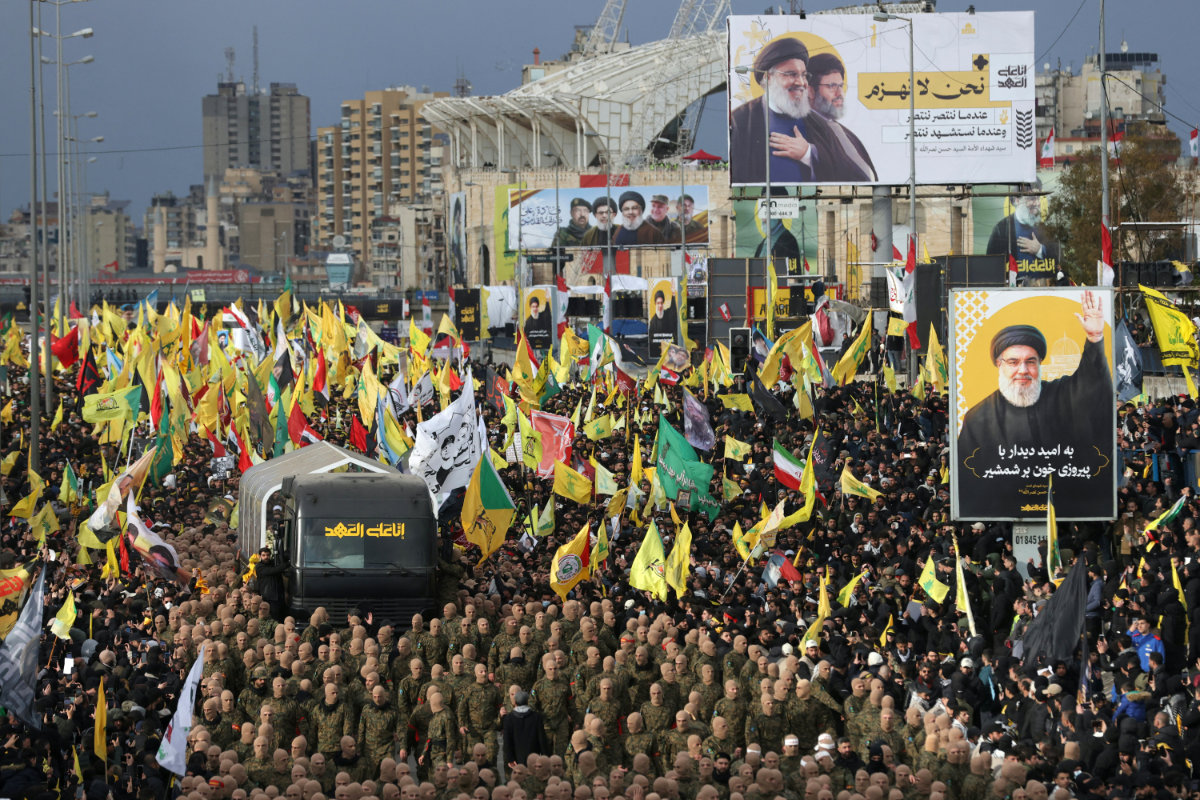
“The Lebanese are certainly ready for a new period in the country where the state has a monopoly over weapons,” Michael Young, a senior editor at the Beirut-based Malcolm H. Kerr Carnegie Middle East Center, told Arab News.
“As for Hezbollah, it is not going to disappear, on the contrary, it is still around. The big question is whether it can transform itself or not.”
The fall of the Bashar Assad regime in neighboring Syria — once a critical supply line for weapons from Iran — has compounded Hezbollah’s woes, leaving it isolated, unable to rearm, and increasingly powerless to dictate Lebanese affairs.
Hezbollah is reportedly facing a financial crisis, leaving it scrambling to provide monetary support to the families of its injured members and to finance reconstruction work in its southern and eastern strongholds devastated by Israeli bombardment.
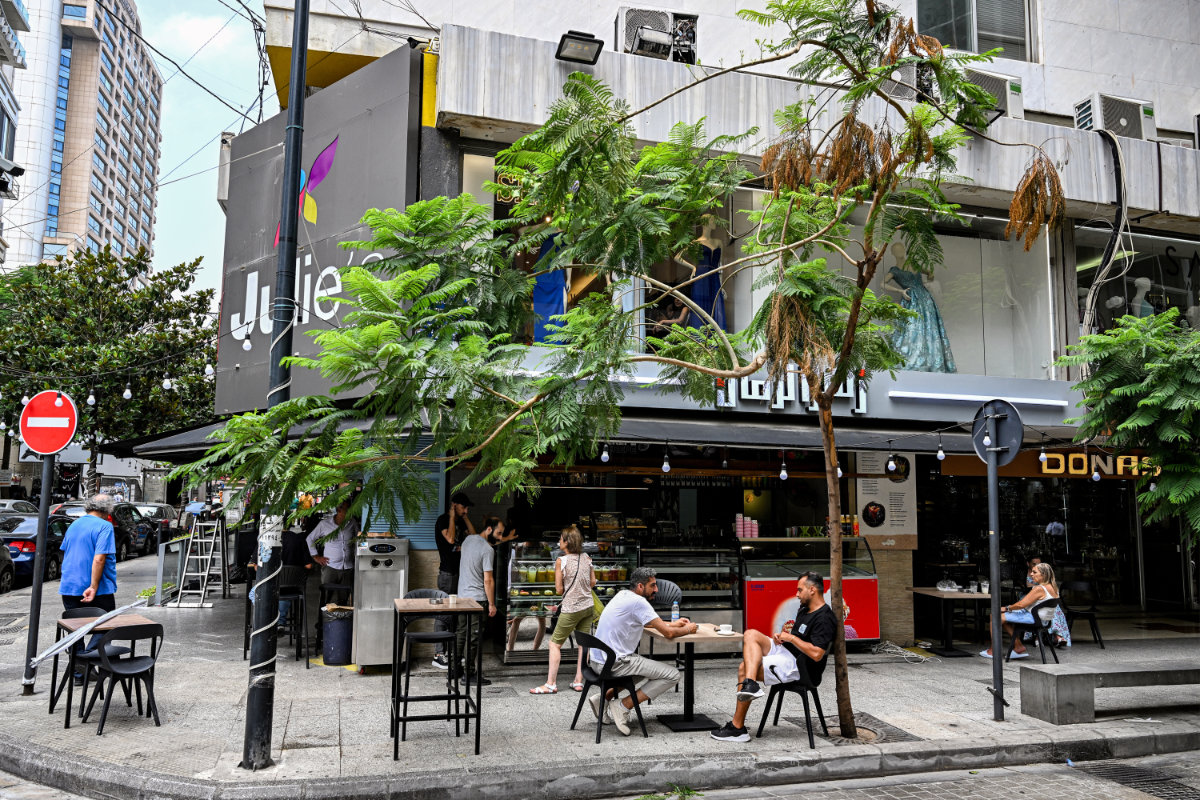
“Some Hezbollah supporters have embraced the change while others are still screaming,” a waiter at one of the cafes along Beirut’s Hamra Street who did not wanted to be identified told Arab News.
“If we have to drag them into this new era kicking and screaming, then we will. It has been about them for so many decades. They left the country broken and darkened. It’s time to move on.”
Many Lebanese have warmly welcomed the end of Iranian hegemony and the crippling of its biggest proxy in the Middle East. The election of former army chief Joseph Aoun as president and ICJ judge Nawaf Salam as prime minister in January is emblematic of this shift.
Backed by the US, France, and Saudi Arabia, Aoun’s election by Lebanese lawmakers is the clearest indication yet that Iran’s influence in Lebanon is spent, opening the way to reforms and international support to help pull the nation out of the mire.

Aoun’s recent visit to Saudi Arabia — the first by a Lebanese leader in eight years — has been regarded as a positive step in resetting ties between the two countries.
During the visit, Prime Minister and Crown Prince Mohammed bin Salman promised to reactivate a $3 billion funding package for the Lebanese army, and a released joint statement declared both sides are looking into ways to allow Saudi citizens to visit Lebanon again.
Both countries are also looking into the resumption of Lebanese imports into the Kingdom, which had been halted due to the smuggling of millions of amphetamine and Captagon pills into the Arab Gulf states via Lebanon, often hidden in regular cargo.
To be sure, not everyone in Lebanon is pleased with the dramatic political shift taking place. Hezbollah supporters have been left reeling since the loss of their charismatic leader and the forced acceptance of the US-brokered ceasefire with Israel, which has been interpreted as a major blow to the “Axis of Resistance” of Iran-backed proxies throughout the region.
“The Shiite community in Lebanon had their golden days under Nasrallah, and now it’s a new phase where they’re mourning the golden days,” Hanin Ghaddar, a senior fellow at the Washington Institute, said in an interview with an Israeli TV channel.
Ghaddar, who is originally from southern Lebanon, said that Hezbollah called for a mass demonstration in downtown Beirut on March 8, 2005, to “ascertain that they’re taking over, inheriting the Syrian army and taking over the Lebanese institutions.”

The war between Israel and the Lebanese militia began on Oct. 8, 2023, when fighters in south Lebanon began firing rockets into northern Israel in solidarity with the Palestinian militant group Hamas, which a day earlier had attacked southern Israel, triggering the war in Gaza.
What began as a tit-for-tat exchange of fire along the Israel-Lebanon border suddenly escalated in September 2024 when Israel intensified its aerial bombardment of Hezbollah positions, attacked its communications networks, and mounted a ground offensive.
IN NUMBERS
• Real GDP (PPP): $65.8 billion
• Total population: 5.36 million
• Public debt: 146.8% of GDP
• Total refugees: 1.27 million+
Source: The World Factbook (CIA)
On Sept. 17-18, thousands of pagers and hundreds of walkie-talkies in the possession of Hezbollah members suddenly exploded in synchronized waves after being sabotaged by Israel. The attack killed 42 and injured 3,500, crippling the militia’s communications.
According to one of Nasrallah’s sons, Jawad, his father was left spiritually broken by the pager and walkie-talkie attack and the death of Fuad Shukr, a senior commander and long-time Hezbollah member, in an Israeli strike.
In an interview with Lebanese television network Al-Manar, Jawad described his father as “spiritless and sad” after these blows.
“You could see that he was hurt,” he said. “There were times I could not bear to hear his voice when he was in that state. You listen to him trying to seek encouragement, but once you hear his voice, it hurts your heart. Later, I learned that he was crying.”

On Sept. 27, 2024, Nasrallah was killed in an Israeli airstrike on an underground Hezbollah headquarters in Beirut’s Dahiyeh suburb. The attack, carried out by Israeli F-15I fighter jets, involved more than 80 bombs, destroying the bunker and nearby buildings.
The Israel military confirmed Nasrallah’s death on Sept. 28, and his body was recovered the following day. The strike resulted in at least 33 deaths and nearly 200 injuries, including civilians.
As the conflict threatened to drag the US and Iran into direct confrontation, with the Islamic Revolutionary Guard Corps and Israel trading missile strikes, the international community acted to secure a ceasefire in November 2024, which has by and large held.
Hezbollah’s battering by Israel has left it politically enfeebled, allowing independent lawmakers and parties not affiliated with the militia to establish a new government after more than two years of political deadlock.

“Up to now there are no signs that the party is going through a reassessment of its previous strategy, although some say within the party such discussions are taking place,” Carnegie Middle East Center’s Young told Arab News.
“Given the hardening of the Iranian position recently, with Supreme Leader of Iran Ayatollah Ali Khamenei saying there can be no negotiations with America, I am not sure that is correct.”
Lebanon remains in the midst of a devastating economic crisis, with the local currency having lost more than 90 percent of its value since 2019 and up to 80 percent of the population living in poverty — at least 40 percent of them in extreme poverty.
Unemployment rates have skyrocketed and banks continue to impose strict controls on withdrawals and transfers. Meanwhile, the World Bank estimates it will cost $8.5 billion to repair the damage of the Israel-Hezbollah conflict.
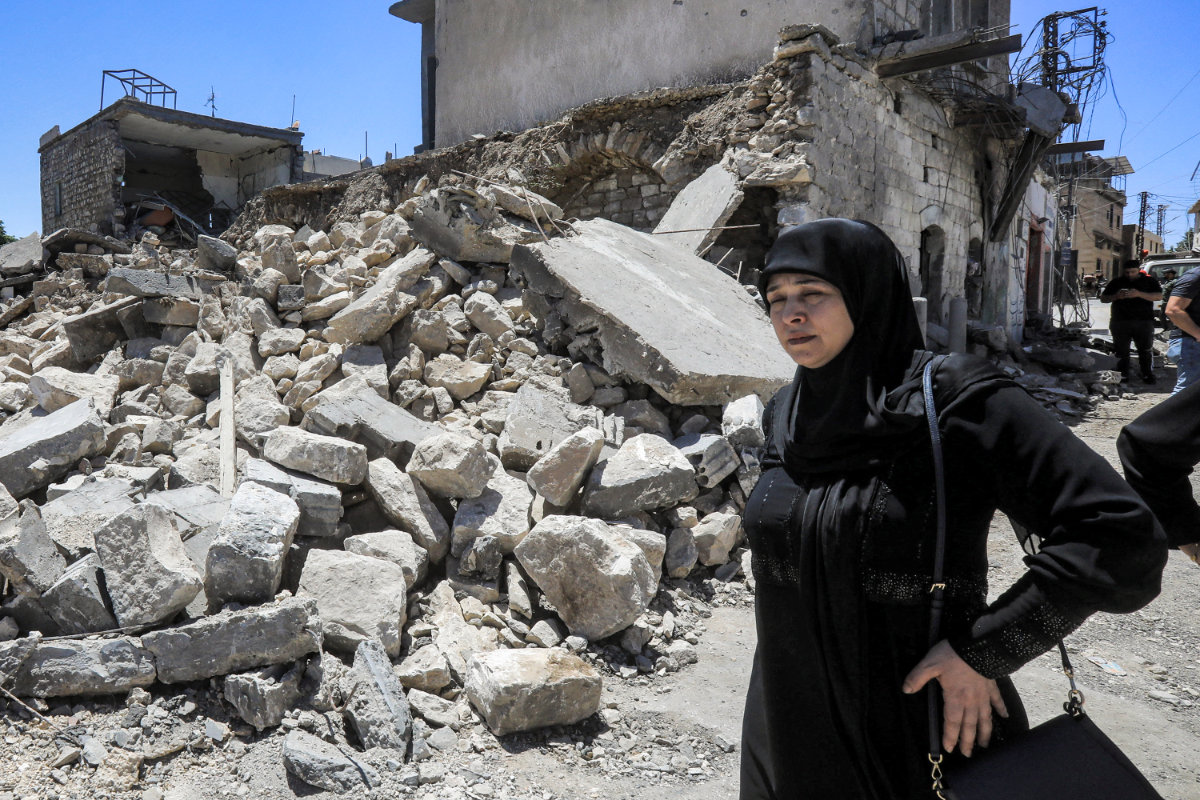
For the thousands of Lebanese who were forced to flee their homes in the south under Israel’s bombardment, the mere suggestion that Hezbollah was somehow victorious in the conflict, as some hardline supporters like to claim, is utterly delusional.
“If my parents return to their village, when should we expect them to be expelled again?” Ali, a university student who now lives with his parents in a cramped Beirut apartment and did not want to give his full name, told Arab News.
“How many more times? We are caught in the crossfire, doomed to be a football between Hezbollah and Israel.
“We are tired of being kicked around. It is shameful. Then you get a deluded supporter who tells you we’ve won. What did we win?”
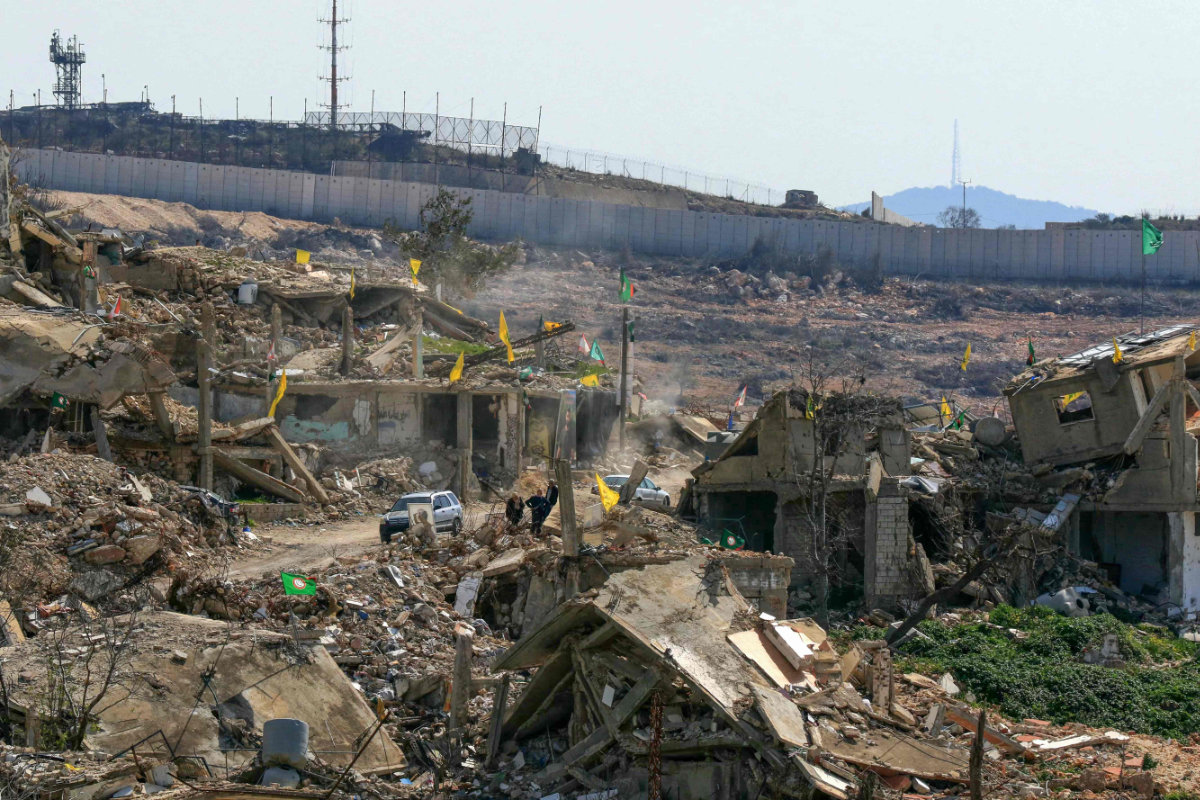
The international community and Arab donors have so far refused to release any aid funds until UN Security Council Resolution 1701 is fully implemented, which calls for the disarmament and disbanding of all armed groups in the country except for the Lebanese army.
After several years of political gridlock and a power vacuum once filled by Hezbollah and the Amal bloc led by Nabih Berri, Lebanon is now in a unique position to stabilize and integrate itself once again into the Arab fold.
President Aoun’s remarks during the Arab League summit in Cairo on March 4 reflect his apparent determination to set Lebanon on this new course, with some describing his speech as “resistance through diplomacy.”
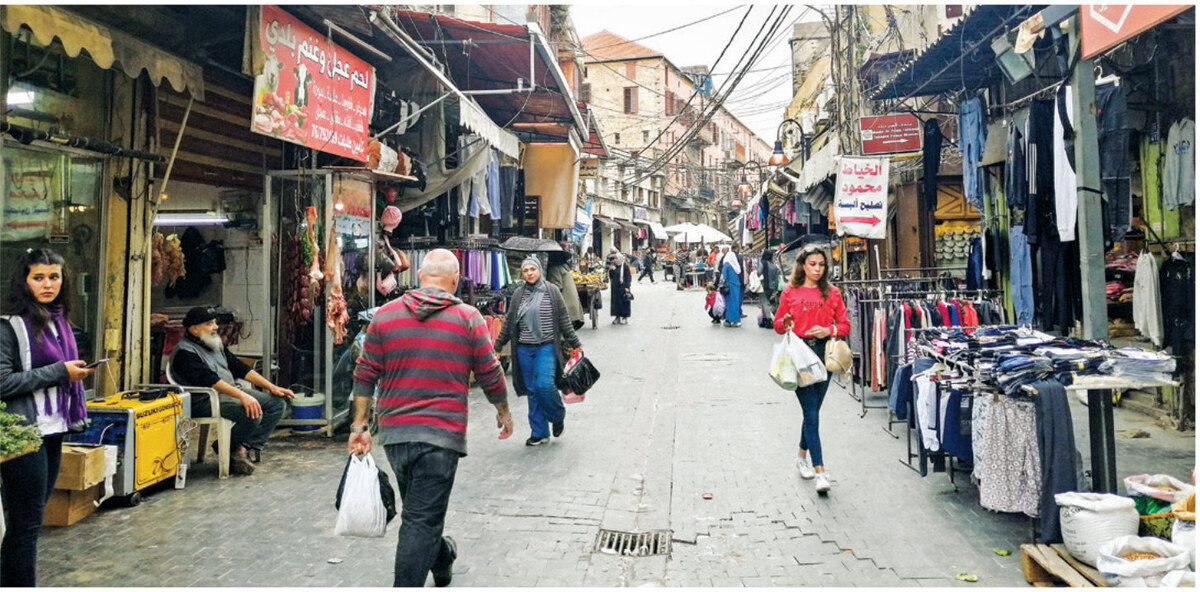
The Washington Institute’s Ghaddar believes that while the current phase may not be “the end of Hezbollah for the (Lebanese Shiite) community,” the lack of money, jobs, services, and reconstruction has led people to seek alternatives.
“It’s very clear that Hezbollah is no longer an option for them,” she said in the interview with the Israeli TV channel.
Today, “Hezbollah is a new entity, which cannot provide, cannot protect, obviously cannot preserve, and cannot rebuild.”
















